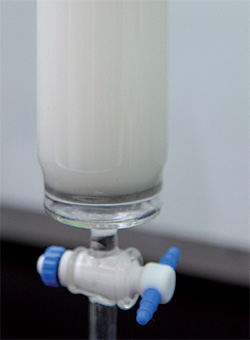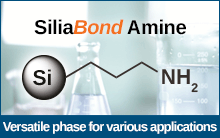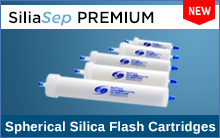Isolation of 13-Methyl-3,4-seco-ent-podocarpanes, rare C18-diterpenoids from the roots of Flueggea virosa by reversed-phase chromatography on SiliaBond C18

Reversed-phase chromatography is a powerful tool in the isolation of new natural products from natural source.
Nature is a never ending source of new potential treatments for challenging diseases. In the course of a research program looking for anti-HCV agents from a medicinal plant, Flueggea virosa, fourteen new C18-diterpenoids (including a new naphtalene derivative) were isolated thanks to reversed-phase chromatography on SiliaBond C18 silica gel. Their structures were resolved by spectroscopic methods and their biological activities were tested against hepatitis C virus (HCV), with a number of structure showing promising results.
Keywords:
natural products, terpenoids, hepatitis C, C18, naphtalene derivative
| Publication | 13-Methyl-3,4-seco-ent-podocarpanes, rare C18-diterpenoids from the roots of Flueggea virosa |
| Authors | Chih-Hua Chao*, Ju-Chien Cheng, De-Yang Shen, Hui-Chi Huang, Yang-Chang Wua and Tian-Shung Wu |
| Organization | School of Pharmacy, China Medical University, Taichung 40402, Taiwan |
| Source | RSC Adv., 2016, 6, 34708 |
| Date | 2016 |
| Reaction scheme |  |
| Full publication | http://pubs.rsc.org/is/content/articlelanding/2016/ra/c6ra00843g#!divAbstract |
SiliaBond Chromatographic Phases

Silica is the most widely used media in chromatography. These bare and grafted supports possess great properties for use as stationary phases and are particularly appreciated for their high mechanical resistance.
SiliaBond Reversed-phase
In reversed-phase chromatography, the packing material is always non-polar (hydrophobic) while the mobile phase is polar to non-polar. An important parameter affecting chromatographic efficiency is the hydrophobicity of the sorbent. As a general rule, stationary phase hydrophobicity increases with the alkyl chain length.
SiliCycle developed an innovative C18 chromatographic phase (More information:







